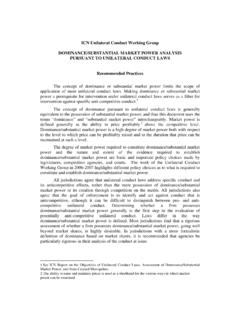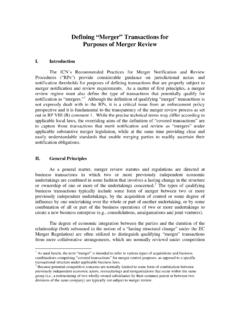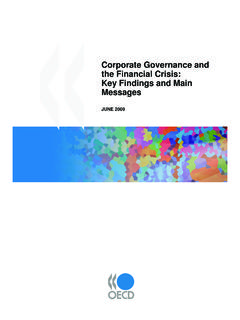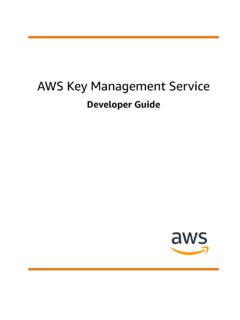Transcription of ICN Key Messages final apr 17
1 1 April 2009 ICN FACTSHEET AND KEY Messages ICN At A Glance The ICN is a specialized yet informal network of established and newer agencies, enriched by the participation of non-governmental advisors (representatives from business, consumer groups, academics, and the legal and economic professions), with the common aim of addressing practical antitrust enforcement and policy issues. By enhancing convergence and cooperation, the ICN promotes more efficient and effective antitrust enforcement worldwide to the benefit of consumers and businesses. The ICN is a results-based, project-oriented organization, which has grown from 16 to 104 competition agencies (from 92 jurisdictions) in 7 years. The ICN is exclusively concerned with competition law It is all competition, all the time . The ICN operates by consensus and its work takes place in working groups, with members and non-governmental advisors (NGAs) conducting discussions, typically via teleconference or e-mail.
2 In addition, members and experts convene annually to discuss working group projects and their implications for enforcement. The next annual conference will be hosted by the Swiss Competition Commission on 3-5 June 2009 in Zurich, Switzerland. With an increasing number of investigations that involve cross-border effects and concurrent reviews by multiple agencies, competition agencies need to collaborate with each other to reduce the risk of: (i) sub-optimal enforcement, and (ii) inconsistent outcomes. The ICN helps to facilitate cooperation and convergence, where appropriate. The ICN has produced a series of practical recommendations and other tools on best practices, investigative techniques and analytical frameworks, which have significantly contributed to cooperation efforts among competition agencies. Notable achievements have been made in the areas of merger review, anti-cartel enforcement, unilateral conduct, competition advocacy, and competition policy implementation, through a variety of practical outputs.
3 These include recommended practices, case-handling and enforcement manuals, reports, templates on legislation and rules in different jurisdictions, databases and toolkits, and workshops. Implementation of these work products, in so far as this leads to optimal enforcement and consistent outcomes, is good for competition agencies, governments, business and ultimately consumers. Importantly, the ICN has also helped to foster closer relations among agency leaders and staff, leading to improved cooperation on cases and a better understanding of each other s laws and policies. 2 ICN Frequently Asked Questions What is the ICN? The ICN is an informal network of established and newer agencies competition agencies with the common aim of addressing practical antitrust enforcement and policy issues. By enhancing convergence and cooperation, the ICN promotes more efficient and effective antitrust enforcement worldwide for the benefit of consumers and businesses.
4 What are the ICN s goals and objectives? The ICN s main goal is to improve and advocate for sound competition policy and its enforcement across the global antitrust community. The ICN seeks to develop and promote sound and principled procedural and substantive benchmarks, and to foster pro-competitive, efficiency-enhancing conduct. These benchmarks can serve as a model for governments and competition agencies looking to develop new laws and policies, and to update current practices. How does the ICN work? The ICN is a results-based, project-oriented organisation, which has grown from 16 competition agencies to 104 competition agencies in 7 years. The ICN is exclusively concerned with competition law. ( It is all competition, all the time .) It operates by consensus. ICN work takes place in practical working groups, with members and non-governmental advisors (NGAs) developing materials and conducting discussions, typically via teleconference or e-mail.
5 Members and experts convene at an annual conference to discuss group projects and the implications for competition policy and enforcement. In addition, ICN working groups organize periodic workshops on specific enforcement and policy topics. ICN is not used as a forum to cooperate on specific cases. Why have the ICN? Economic globalisation has resulted in an increasing number of investigations and reviews of mergers, cartels and unilateral conduct that transcend jurisdictional boundaries. Agencies need to cooperate with each other on cross-border cases in order to reduce the risk of: (i) sub-optimal enforcement if an agency only has a partial picture of the situation; and (ii) inconsistent outcomes if different jurisdictions reach different conclusions about the same practice. The ICN helps facilitate cooperation and convergence, where appropriate.
6 This is good for competition agencies, governments, businesses, and ultimately consumers. 3 What is the value of the ICN for competition agencies? The ICN encourages dissemination of antitrust experience and best practices on topical issues to promote convergence toward sound competition policies and practices, cooperation and better understanding among agencies. It is therefore of value to both established and newer competition agencies. What is the value of the ICN for governments? The ICN s goal of improving competition policy and enforcement, and the ICN s advocacy of competition principles, facilitate open and competitive markets for the benefit of businesses and consumers. The ICN promotes cooperation and convergence, encouraging the exchange of best practices among ICN members. In addition, the ICN s work products are useful to governments that are introducing competition law for the first time or are revising their rules, for example in order to enhance pro-competitive regulation more generally.
7 What is the value of the ICN for business? Poorly conceived competition policy and its enforcement can impose unnecessary costs and uncertainty on the business community and marketplace. The ICN works to promote sound and principled procedural and substantive standards that minimise these costs and burdens, allowing pro-competitive conduct to flourish. What is the value of the ICN for consumers? The ICN works to facilitate improved enforcement and advocacy of competition law, which fosters vibrant competition in open and well-functioning markets and optimizes consumer welfare. This should create conditions that promote lower prices and wider consumer choice. What has the ICN achieved? The ICN has produced a series of practical recommendations and other tools on best practices, investigative techniques and analytical frameworks, which have significantly contributed to cooperation efforts among competition agencies.
8 Notable achievements have been made in the areas of mergers, cartels, unilateral conduct, advocacy, and competition policy implementation, through a variety of practical products and outputs. These include recommended practices, case-handling and enforcement manuals, reports, templates on legislation and rules in different jurisdictions, databases and toolkits, and workshops. 4 According to a recent outreach survey1, 96% of competition agencies surveyed make use of ICN work products and materials, and 94% distribute them inside the agency. 77% use ICN materials for reference purposes, 46% for staff training and 40% for outreach. 69% of all agencies say they are pro-actively working towards applying ICN Recommended Practices (71% of newer and 65% of established agencies). Who are the ICN s stakeholders? The ICN has a wide range of stakeholders in addition to its member competition agencies.
9 These include the business community, legal and economic professions, consumer representatives, academics, and policy makers. How does the ICN engage with its stakeholders? The ICN engages with its stakeholders by way of informal collaboration, which is consistent with an informal network. NGAs volunteer to participate in the ICN by contacting their respective member agencies. They may contribute to the work carried out by the ICN including for example: o making available their expertise and actively being involved in the draft work product of the ICN, including recommended best practices and guidelines; o identifying issues and factors to be considered by the Steering Group, and other Groups of the ICN; o identifying potential projects. NGAs also actively participate in the annual conference. Why is the ICN not an inter-governmental organisation? The ICN is organised by and for competition agencies.
10 It provides a forum for both established and newer competition agencies to have equal and direct input to practical discussions on competition enforcement issues. The ICN s work products are not legally binding instruments. What are the ICN s next objectives? Increased emphasis on outreach and implementation. Promoting exchanges on practical experience will be particularly important in this regard, for example through the use of teleconferences, web-based tools, and workshops. 1 5 Continued progress towards consensus building, cooperation and convergence toward sound competition policy and practice, as well as better understanding of each other s laws and policies. ICN In-Depth What is the ICN? The ICN is a network of established and newer competition agencies, with the common aim of addressing practical antitrust enforcement and policy issues.








![[MERGER NOTIFICATION PROCEDURE TEMPLATE]](/cache/preview/4/4/e/2/5/9/d/c/thumb-44e259dc3896a9580aeac27f113f9044.jpg)







